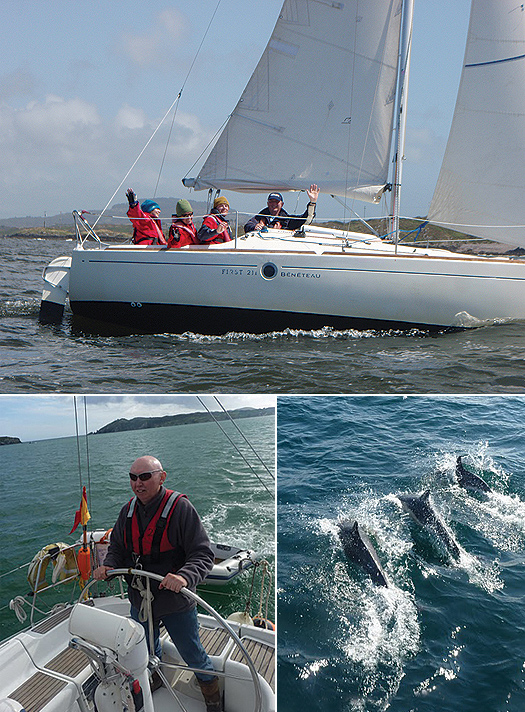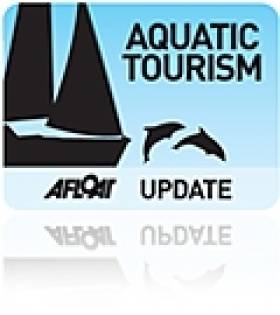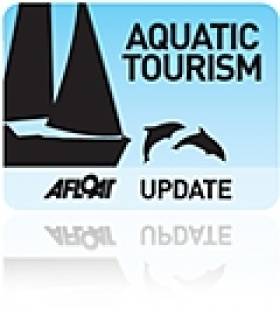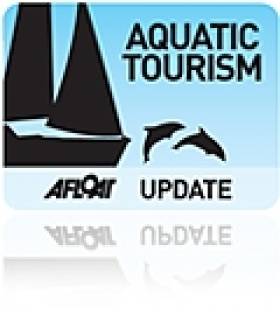Displaying items by tag: Glenans Irish Sailing Club
A Tribute to the Late Áine Meehan (née Gray) of Glenans
Áine Gray is an ever-present figure in any recollection of Glenans Ireland in the 1970s. Áine was always around to help and support whatever enterprise was afoot. She served on the committee for many years and made a huge contribution to producing issue after issue of the Glenans Newsletter.
That was in the days before PCs, not to mention smartphones. Áine worked for IBM, which in those days sold typewriters. She had access to the then cutting-edge IBM Golfball typewriter on which she produced the Newsletter from often indecipherable hand-written submissions. Áine was the Newsletter!
Áine had great organisational talents which she combined with a warm, friendly and engaging personality. This combination, and her forceful input on the Committee, played a significant role in helping Glenans to grow and develop in the 1970s.
Áine was involved at the same time as Michel Pinot was in charge of Glenans in Ireland and he sent on this tribute:
Very sad to learn that our friend " Áine Gray" died last night. Her name reminds me of a beautiful person on whom we could count within the great adventure of the Glenans Irish. We will miss you terribly Áine.
We were all glad to see Áine in 2012 at the 1970s Reunion in Baltimore. Despite ongoing health issues, she made a special effort to attend and to reconnect and remember good times with old friends.
Áine had two sons, Simon and Conor, to whom she was devoted and who have been a support to her through recent years of poor health.
Apart from sailing and cruising on Mousquetaires, Áine enjoyed the working weekends, and never had a problem getting stuck in. Around 1976, a gang of us were working on Bere Island between Christmas and New Year. A turkey had been brought down by Áine and duly cooked and enjoyed by all. But we had not planned much for the following day. I have a vivid recollection of Áine revisiting the carcass to produce an unbelievable amount of meat and avert a crisis.
It was a pleasure to have known her. May she rest in peace.
Tribute provided by Michel Pineau, David Bagnall and Tony Linehan
Les Glenans Sail Training School to Close Irish Bases
#glenans – Les Glenans, the French sail trainers, one of the biggest sail training establishments in Ireland, is to close its operations at two bases in Ireland at the end of the month.
In July, Afloat reported the recession hit school warned of possible closure of its Collanmore and Baltimore bases and in a statement last night entitled 'CALLING ALL MEMBERS' a message on the Glenans facebook page confirms the sad news: 'It is with teary eyes that we regretfully inform you that after 44 years.....the board of directors of Glenans voted 10 to 4 in favour of closing both Irish bases and thereby ceasing all activity in Ireland'.
The popular sail training club has been one of the largest such organisations in the country over the past 44 years, training up to an estimated 40,000 in that period.
The association currently has 1,500 members in Ireland and was reintegrated with its French counterparts in November 2010, a move Les Glenans said at the time would underpin its future.
The statement continues 'So at the beginning of October, the doors will close and we are unsure who it will be opening them next year. The members of the Irish sector committee are presently exploring options for 2014, and we will keep you posted on any developments.......It was a pleasure........Thanks to everyone who made it possible down through the years....'
Recession Hit Glenans Warns of 'Possible Closure' of Collanmore & Baltimore Sail Training Bases
#glenans – A 'financially struggling' Les Glenans association is considering closing the doors on its operation in Ireland, according to president Michael O'Meara who signalled the potential move to members in a letter last Friday. No decision has been made yet, but it looks likely at least one of two Irish bases will close at the end of the year.
The popular sail training club has been one of the largest such organisations in the country over the past 44 years, training up to an estimated 40,000 in that period, O'Meara told Afloat.ie.
The association currently has 1,500 members in Ireland and was reintegrated with its French counterparts in November 2010, a move Les Glenans said at the time would underpin its future.
Its 2013 season brochure was launched with some fanfare in April by Leo Varadkar TD, Minister for Transport, Tourism and Sport in Dun Laoghaire, but a lack of demand for courses since has caused it to review its Irish operation. It is looking at closing bases in Collanmore, County Mayo and Baltimore in West Cork.
'There are a number of reasons for this, including (but not exclusively) the repayment of GISC [Glenans Irish Sailing Club] debt and the current economic situation in Ireland as well as in France', O'Meara said in his letter last Friday.
Though the total numbers of trainees increased in the immediate year after reintegration this initial increase was in French trainees not in Irish ones, and this has not been sustained.
Despite large investment, the 'Secteur' has continued to make a loss, O'Meara said:
Some of the reasons cited for the decline include:
· Economic crisis in Ireland and across the EU
· Very poor summer weather since 2009 - people preferring to travel abroad. This has added to the continued decline in adult dinghy and catamaran sailing.
· Prohibition on paid advertising and marketing since the integration
· Website and translation issues
The total Glénans association has also experienced poor financial performance in recent years. 2010 was the last year in which the association made a positive result.
Unfortunately,a large fraction of this cost and loss is pertaining to the Irish Secteur. The poor performance and financial results are not sustainable and if not significantly improved (i.e. increase in trainees and course sales) will jeopardise the future of the overall organisation.
As a result, there are a number of solutions presently being discussed by management and the board of directors. Whilst no decisions have yet been made, it is likely that one of the Irish bases (Collanmore) will close permanently at the end of the 2013 season.
There is also the possibility that without a swift major upturn in Irish activity Baltimore will also close at the end of the current season - thus ending the Glénans activity and presence in Ireland.
There are a number of external factors to be taken into account before any further discussion by the Les Glénans board (Conseil) can take place and before any decision can be made.
Meanwhile, the Secteur Committee has formed a working group to explore all solutions to the situation and to formulate a proposal to the board in order to ensure the continuation of operations in Ireland.
O'Meara has urged members to give their 'continued support' for the association. 'Booking in for courses and raising the profile by word of mouth and other means will increase our activity level, provide tangible support to our proposal and may have an influence in the decision making process'.
In 2009, the Irish club raised in excess of €80,000 from members and supporters. The fundraising, undertaken to help secure the clubs future, and allowed Glenans to upgrade its fleet and continue to offer high quality RYA and ISA approved sail training at its bases in Baltimore in west Cork and Collanmore in Clew Bay.
But in November 2010, members of Ireland's biggest sail training organisation, Glenans Irish Sailing Club voted unanimously to reintegrate with the French-based sailing association Les Glenans as a means of stemming losses.
The decision was designed to allow the Glenans sailing school activity to continue in Ireland at both bases in Collanmore and Baltimore, and it secured the financial future of the Irish organisation which has experienced an increasingly difficult trading environment
It was thought at the time the reintegration would reunite the two associations which share the common aim of bringing people together through a love of sailing and the sea. The idea was to give the Irish members access to Les Glenans' Europe wide sailing activities and allow Les Glenans to offer a unique Irish sailing experience to its 14,000 members.
Under the 2010 agreement Les Glenans took over the assets and liabilities of Glenans Irish Sailing Club. The Club's two Irish sail training bases at Baltimore, County Cork and at Collanmore Island, in Clew Bay, County Mayo continued to operate .
The Irish bases become part of Les Glenans network of sailing bases across France and Italy. Ireland formed one of Les Glenans five administrative sectors, with Irish members having full voting rights in the enlarged association.
Minister for Transport Takes the Helm in Dun Laoghaire
#glenans – Leo Varadkar TD, Minister for Transport, Tourism and Sport took up the offer of a sailing lesson in Dun Laoghaire harbour last Sunday after performing the official launch of the 2013 Les Glenans Ireland brochure at the National Yacht Club.
Minister Varadkar congratulated Les Glenans for it's significant contribution to Irish tourism. Each year the organisation welcomes several hundred trainees to it's bases at Baltimore in county Cork and on Collanmore Island in Clew Bay, county Mayo.
After meeting many of the Les Glenans volunteers, Minister Varadkar joined Les Glenans cruising instructor Seamus Fitzgerald and a number of trainees on board a 1720, lent by the Royal Irish Yacht Club.
Taking the helm as the boat slipped it's lines, the Minister enjoyed his first experience of small boat sailing in a moderate breeze and warm sunshine.
For information on Les Glenans courses and bookings in Ireland see The Glenans website or call 028 20 630
Glenans Sailing School Launch 2013 Season in Dun Laoghaire
#glenans – Minister for Transport, Tourism and Sport Leo Varadkar launched Glenans 2013 season this afternoon at the National Yacht Club in Dun Laoghaire.
As Europe's largest sailing school the French club has bases in Baltimore in West Cork and on Collanmore Island on Clew bay in County Mayo.
The Minister helped the school to launch its annual Irish sales brochure.
The Irish Glenans operation was established in 1969 and was reintegrated into its French parent in 2011.
Entente Cordiale - Glenans Ireland Reunites with France
After a quarter of a century, Glenans Irish Sailing Club has been reunited with its French parent association, writes Bryan Dobson.
Well known to generations of Irish dinghy and keel boat sailors, the Glénans sail training bases at Baltimore, Co Cork, and Collanmore Island in Clew Bay, Co Mayo, are reopening this season under new French/Irish management. The merger of Glenans Irish Sailing Club (GISC) with Les Glénans of France, prompted by financial difficulties in the Irish club, was approved by the two organisations last November, securing the future of the Irish bases which now becomes Les Glénans newest secteur.
The Irish operation, founded by the French in the 1960s but independent since the 1980s, will form part of an association which trains some 14,000 people each year, making it Europe's largest sail training organisation.

"It enables GISC to become part of a financially sound organisation with the same ethos," said Emma Sweeney, who was recently elected President of the Irish secteur committee. She and the 11 other committee members will assist in the running of the Irish bases, working with the French-appointed chef de base, Tom Daune.
Daune, who was an assistant chef de base for Les Glénans at île d'Arz in the Morbihan in Brittany since 2006, says they will "continue to refresh the fleets and buildings on the two bases" and "develop more cruising activity in Baltimore", as well as looking at the introduction of windsurfing in Collanmore.
Les Glénans has already demonstrated its commitment to the Irish secteur with new boats and equipment in place for the coming sailing season. The base at Collanmore in Clew Bay has taken delivery of 18 new catamarans. In Baltimore, the fleet of specially-designed Les Glénans 570 keel boats has been overhauled and added to, with each named after one of the seven deadly sins! The Glénans moorings at Baltimore have also been extended to accommodate two newly-delivered Sunfast 32s, which will be available for sailing courses in the magnificent cruising grounds of West Cork along with club's Sunfast 37 Sherkin ll.
Tom Daune says they "hope to have some strong links between Irish and French members....to permit them to sail together and to build a common knowledge. The courses are all bilingual. The main language is English, and French will be present too. So we have to develop our franglais."
"They're just mesmerised by the Irish coast," said Emma Sweeney of the French sailors from Les Glénans that she has met. She believes the merger will result in "significantly larger numbers of people coming to Ireland to sail in Baltimore and Collanmore".
And for the first time, Ireland will have a voice at the top table in Les Glénans with the election of Sinead MacAleese to the governing board of the organisation, the Conseil d'Administration. At the association's recent AGM, she topped the poll, out of 13 candidates, to secure one of only four vacancies on the Conseil.
A member of GISC for the last ten year and now based in Prague in the Czech Republic, Sinead has lived and worked in France for the last 12 years. She was one of the team that helped negotiate the merger of the two organisations, a development which she describes as "a great opportunity for the club to grow on two fronts".
Firstly, she believes there is an opportunity to deepen the ethos of Les Glénans, which is based on sailing without borders, on friendship and on volunteerism. "Volunteering is very important, a real core value," she said. And then there is the international dimension to the merger. "This is an opportunity for France to grow internationally." Les Glénans has a number of bases in Italy but Ireland is its first fully non-French secteur. And it means Les Glénans can offer Englis-speaking sailing courses to French and other non-Irish trainees in Ireland."They are very keen on developing English speaking courses," said Paul Rossiter, who was chairman of GISC in the run-up to the merger. A key member of the Irish negotiating team, he says the French association wanted to "spread their wings" as well as "insure that Glénans activities continued in Ireland".
Tom Daune believes it will be "very exciting for French, Belgian, Italian or Spanish members to sail in Ireland with Les Glénans. It's a new sailing area with an amazing landscape...and it's a fabulous place to learn more."
Les Glénans will be running courses at Baltimore and Collanmore from April through to October, for both adults and teenagers.
And according to Tom Daune, they can expect a unique experience: "Glénans arises from the dream of a more brotherly society and from a passion for the sea...Glénans is a sailing school, a sea school and a school of life."
For Les Glénans bookings see www.glenans.ie or phone 0033 153938600 (dial 1 and 1)
Glenans Irish Sailing Club to Reunite with Les Glenans in France
The reintegration will reunite two associations which share the common aim of bringing people together through a love of sailing and the sea. It will give the Irish members access to Les Glenans' Europe wide sailing activities and allow Les Glenans to offer a unique Irish sailing experience to its 14,000 members.
The decision will allow the Glenans sailing school activity to continue in Ireland at both bases in Collanmore and Baltimore, and it secures the financial future of the Irish organisation which has experienced an increasingly difficult trading environment since the start of the recession.
Paul Rossiter, Chairman of Glenans Irish Sailing Club welcomed the unanimous vote in favour of the reintegration. "This sends a clear signal to Les Glenans that our members are strongly in favour of reuniting our interests", he said. "Les Glenans is the perfect partner," he added. "We share the same values and objectives, and the same DNA."
Luc Fourichon, the President of Les Glenans said "One of our main aims is to create, by sailing, links between members from various countries and various walks of life. Our Irish friends are very welcome on board. Let's sail together"
Under the agreement Les Glenans will take over the assets and liabilities of Glenans Irish Sailing Club. The Club's two Irish sail training bases at Baltimore, County Cork and at Collanmore Island, in Clew Bay, County Mayo will continue to operate with new investment in equipment and facilities planned.
The Irish bases will become part of Les Glenans network of sailing bases across France and Italy. Ireland will form one of Les Glenans five administrative sectors, with Irish members having full voting rights in the enlarged association.
Glenans Irish Sailing Club
Glenans Irish Sailing Club is a non-profit sailing school affiliated to, but now independent of the larger French Les Glénans sailing school. They offer courses in cruisers, catamarans, dinghies and windsurfing. The sailing bases are on Collanmore Island in Clew Bay, and at a converted railway station in Baltimore, Co. Cork.
As a non-profit organisation, Glenans members have a great commitment to sailing. Properly known as Glenans Irish Sailing Club (GISC), it was founded in 1969 when the first base in Baltimore was opened. The club operates largely using volunteer instructors, backed by a small professional staff on the bases and in the Baltimore office.
The club provides instructor courses approved by the Irish Sailing Association (ISA). Sailing courses are available from May to October, with some weekend courses outside the main period. Course participants automatically become members of the club.
GISC Office – The Station House, Baltimore, Co. Cork. Tel: +353 (0) 28 20630. fax: +353 (0) 28 20312, email: [email protected]
Have we got your club details? Click here to get involved




























































